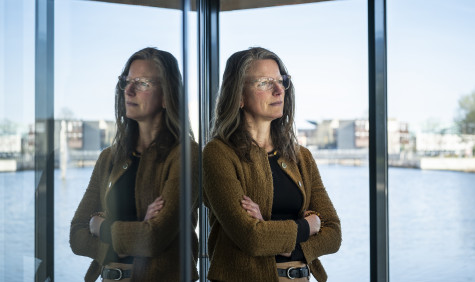"We need to give the conversation about digital sovereignty the space it deserves in the coming period, and it’s a conversation that executives and CIOs need to have together: who do we want to be?"
"Who do we want to be?" Nolda Tipping-Griffioen on the future of technology at the RUG
She loves complex challenges and goes the distance, at work and in her spare time. As the new CIO and IT director, Nolda Tipping-Griffioen has ambitious plans for the University of Groningen's digital strategy. She also recently completed a half-marathon. As an endurance runner, she feels at home in academia. "A sprinter would have a hard time here," she says.
Last summer, Nolda joined the University of Groningen (RUG) as chief information officer (CIO) and director of the Centre for Information Technology (CIT), which facilitates research and education with data and IT solutions. As with most large universities, there is no shortage of complex challenges at the RUG.
Enjoying interesting initiatives
The faculties of the RUG are quite autonomous, and IT is regulated differently everywhere. "That is also something very nice about the university, so that decentrality is not necessarily going to change. We have to make use of it: enjoy it and encourage all kinds of initiatives to arise naturally. In the field of AI, for example, very interesting tools have already been developed."
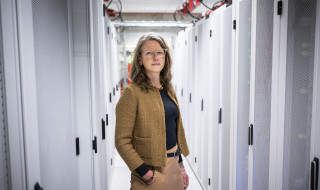
"I want to get the basics right, there is still a lot of work to do"
However, according to Nolda, there needs to be more consistency, insight and overview, and everything must comply with legislation. "It may not sound very glorious, but one of the key points I will be working on in the coming years is getting the basics in order. Not only for ourselves as CIT, but also across the entire university. We need to understand what the IT landscape looks like. How are we doing in terms of security, ownership, and authorizations? Where are our weak spots?"
No more panic mode
Another very important focus for the near future is predictability: "We need to have a clear picture of the replacement processes throughout the RUG well in advance, so we don't end up in a kind of panic mode every time. Just getting in control on all fronts. Well, we still have some work to do to get there. If at some point I and the administrators around me start getting bored, that means we’ve succeeded."
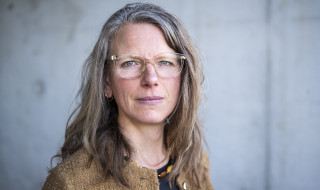
"I think I'm a bit addicted to endorphins"
Not only in her work, but also in sports, Nolda is an endurance runner. She recently ran the half marathon in Haren. "I think I'm a bit addicted to the endorphins," she says. A nice parallel with her work, because at the university she also needs to take a long-term view, because decision-making takes quite a bit of time. "As a sprinter, you’d have a hard time in academia."
Making a difference
She consciously made the switch from the commercial to the public sector a few years ago: after a career at Shell and NAM, she became ICT director at DUO, the executive organisation for student funding. "A great position, because you really contribute to education in the Netherlands and employment in the north region. A good salary is nice, but I also think it's important to make a difference in someone else's life."
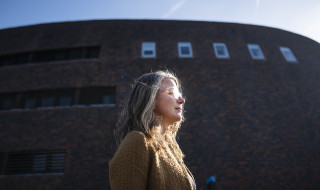
"We need to think more strategically about technology"
She recommends it to everyone to gain experience in both the commercial and public world. "From the corporate world, I know that it is quite possible to work a bit more efficiently. It is quite healthy for an organisation to experience once in a while what it's like to work with leaner budgets."
Challenges were also ample at DUO. In some cases, renewal of IT systems turned out much more expensive than anticipated. "With an IT project in such a brownfield environment - an existing, older environment - it is very difficult to estimate in advance how much time and money it will cost. Just like when renovating an old house - we live in an old farmhouse here in Groningen; you always come across unexpected things. That was also what we ran into at DUO. It is complex to properly manage large IT projects in an existing organisation."
Proud
Nevertheless, she says, DUO has managed to set up an entire portfolio of replacement projects - the lifecycle management - and she is proud of that. "Having a clear overview of what needs to be replaced when, and migrating the applications off a platform in time. Making sure the new platform is up and running before the old one goes out of support and is no longer secure. I want to move in that direction here at the RUG too."

The Aletta Jacobs room is used for digital testing
"I think technology is becoming more of a primary process and we need to think about it more strategically. I managed that at DUO and want to make it part of the RUG strategy. I want to move from reactive to proactive, and position IT much more centrally in who we are as a university and what we have to offer to society."
Digitally literate
Nolda sees technology not only as supportive, but also as something to equip students with. Especially in the field of AI. "Students, teachers and researchers need to be digitally literate. As CIO, I have a responsibility to contribute to that."
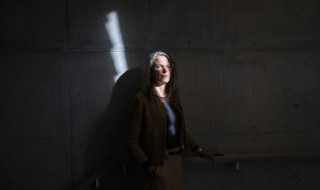
"I want to position ict much more centrally in who we are as a university and what we have to offer to society."
Given the geopolitical situation, the topic of digital sovereignty keeps coming up in conversations Nolda has with other CIOs, including in the SURF context. "I think that also shows that the position of CIOs is becoming increasingly important. Ict is no longer a side-issue, we have to start thinking much more strategically: which long-term relationships have we entered into, and what does that mean for the university's strategy? Which independence do we want to keep, or not, and what are the long-term implications? Where do we want to go in the coming period when it comes to data and AI?"
Administrators and CIOs hand in hand
"Who do we want to be? We need to give that conversation the space it deserves in the coming time. Because suppose you want to get completely detached from US big tech; you won't get that done in a week. So we have to work together even more purposefully. I invite directors to do that hand in hand with their CIOs, to make sure we do the right things in the coming years."
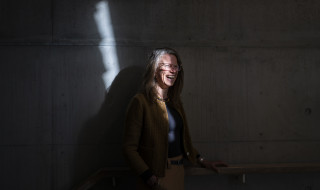
"I enjoy contributing to the teaching and research that happens here"
AI for a potato farmer
Besides strategic issues, Nolda also gets excited by how concretely IT innovation helps researchers, students and others: when doing research or treating patients in the UMCG, when PhD students can generate more scenarios or perform better literature research. "We are sitting here now talking above a lecture hall and when I go downstairs, I see the students walking around. All those young people around you give a feeling of energy. I am not teaching classes myself, but I contribute to their learning experience and to the research that happens here. I think that's wonderful."
"A group of data scientists recently developed a large language model for a potato farmer here in the region, and he can use it to automatically classify his potatoes. Super nice, because you make such a farmer's life a lot easier. When I cycle past a potato field on my way home, I think about that."
Text: Josje Spinhoven
Photos: The Beeldredaktie / Kees van de Veen
CV
- Nolda Tipping-Griffioen studied Industrial Engineering at Delft University of Technology
- 2002-2019: various positions at Shell
- 2020-2024: Director ICT at the Education Executive Agency (DUO) of the Ministry of Education, Culture and Science
- 2024: Chief Information Officer (CIO) and director of the Centre for Information Technology (CIT) at the RUG
- Member of SER Top Women
